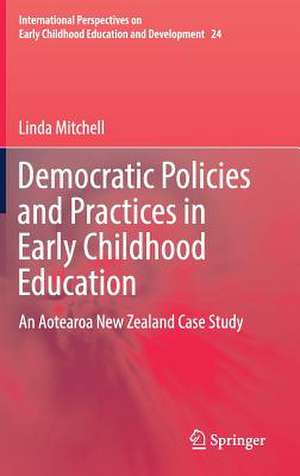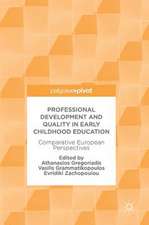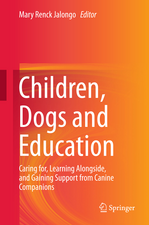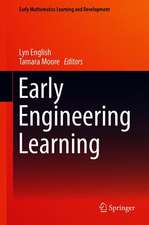Democratic Policies and Practices in Early Childhood Education: An Aotearoa New Zealand Case Study: International Perspectives on Early Childhood Education and Development, cartea 24
Autor Linda Mitchellen Limba Engleză Hardback – 3 noi 2018
The book starts with an analysis and critique of global trends in ECEC in countries that share capitalist mixed economies of welfare, and where competition and marketisation have become dominant principles. It then analyses ideas about children, childhood and ECEC within a framework of democracy, going back to the Athenean origins of democracy and including recent literature on meanings and traditions of democracy in education. The book uses vivid examples from researching curriculum, pedagogy and assessment practices within Aotearoa New Zealand ECEC settings and collective action to influence policy change in order to illustrate opportunities for democratic education. It concludes by examining what conditions might be needed for integrated and democratic ECEC provision in Aotearoa New Zealand, and what changes are necessary for the future. It offers a compass not a map; it points to promising directions and provides insights into issues in ECEC policy and practice that are of current global concern.
| Toate formatele și edițiile | Preț | Express |
|---|---|---|
| Paperback (1) | 481.58 lei 6-8 săpt. | |
| Springer Nature Singapore – 2 feb 2019 | 481.58 lei 6-8 săpt. | |
| Hardback (1) | 584.76 lei 6-8 săpt. | |
| Springer Nature Singapore – 3 noi 2018 | 584.76 lei 6-8 săpt. |
Din seria International Perspectives on Early Childhood Education and Development
- 18%
 Preț: 786.98 lei
Preț: 786.98 lei - 18%
 Preț: 1005.11 lei
Preț: 1005.11 lei - 24%
 Preț: 673.37 lei
Preț: 673.37 lei -
 Preț: 281.26 lei
Preț: 281.26 lei - 18%
 Preț: 788.72 lei
Preț: 788.72 lei - 18%
 Preț: 1005.74 lei
Preț: 1005.74 lei - 15%
 Preț: 642.18 lei
Preț: 642.18 lei - 15%
 Preț: 644.18 lei
Preț: 644.18 lei - 15%
 Preț: 645.79 lei
Preț: 645.79 lei -
 Preț: 390.46 lei
Preț: 390.46 lei - 18%
 Preț: 729.53 lei
Preț: 729.53 lei - 18%
 Preț: 892.90 lei
Preț: 892.90 lei - 24%
 Preț: 843.77 lei
Preț: 843.77 lei - 15%
 Preț: 647.40 lei
Preț: 647.40 lei - 15%
 Preț: 703.06 lei
Preț: 703.06 lei - 24%
 Preț: 596.06 lei
Preț: 596.06 lei - 18%
 Preț: 786.36 lei
Preț: 786.36 lei - 15%
 Preț: 638.76 lei
Preț: 638.76 lei - 18%
 Preț: 895.76 lei
Preț: 895.76 lei - 24%
 Preț: 747.51 lei
Preț: 747.51 lei - 18%
 Preț: 944.82 lei
Preț: 944.82 lei -
 Preț: 423.08 lei
Preț: 423.08 lei - 18%
 Preț: 944.36 lei
Preț: 944.36 lei - 18%
 Preț: 890.23 lei
Preț: 890.23 lei -
 Preț: 358.01 lei
Preț: 358.01 lei - 15%
 Preț: 639.25 lei
Preț: 639.25 lei - 24%
 Preț: 738.66 lei
Preț: 738.66 lei - 15%
 Preț: 642.51 lei
Preț: 642.51 lei - 18%
 Preț: 777.03 lei
Preț: 777.03 lei - 24%
 Preț: 744.31 lei
Preț: 744.31 lei
Preț: 584.76 lei
Preț vechi: 687.95 lei
-15% Nou
Puncte Express: 877
Preț estimativ în valută:
111.89€ • 116.82$ • 92.61£
111.89€ • 116.82$ • 92.61£
Carte tipărită la comandă
Livrare economică 04-18 aprilie
Preluare comenzi: 021 569.72.76
Specificații
ISBN-13: 9789811317910
ISBN-10: 9811317917
Pagini: 179
Ilustrații: IX, 176 p. 3 illus.
Dimensiuni: 155 x 235 mm
Greutate: 0.44 kg
Ediția:1st ed. 2019
Editura: Springer Nature Singapore
Colecția Springer
Seria International Perspectives on Early Childhood Education and Development
Locul publicării:Singapore, Singapore
ISBN-10: 9811317917
Pagini: 179
Ilustrații: IX, 176 p. 3 illus.
Dimensiuni: 155 x 235 mm
Greutate: 0.44 kg
Ediția:1st ed. 2019
Editura: Springer Nature Singapore
Colecția Springer
Seria International Perspectives on Early Childhood Education and Development
Locul publicării:Singapore, Singapore
Cuprins
1 Introduction.- 2 Aotearoa New Zealand within global trends in ECEC policy.- 3 Traditions of democracy in education.- 4 Weaving a curriculum.- 5 Assessment and pedagogical documentation.- 6 Influencing policy change through collective action.- 7 Policy frameworks and democratic participation.- 8 Conclusion.
Notă biografică
Linda Mitchell is Associate Professor of Early Childhood Education and Director of the Early Years Research Centre at The University of Waikato, New Zealand. She has built a national and international reputation through her research and publications in early childhood education policy, and has been a strong critic of the marketization and commercialisation of education and their impact on children, families and early childhood services. Other current areas of her research are assessment, culturally responsive pedagogy, and connections with parents, families and community. A main interest is in democratic policies and practices in early childhood education.
Textul de pe ultima copertă
This book uses case studies of Aotearoa New Zealand policy formulation and practice to explore early childhood education and care (ECEC) as a site for democratic citizenship and social justice. Addressing fundamental questions about the purpose of education, it argues for explicit values focusing on children and childhood as a basis for ECEC policy to replace discourses of economic investment and child vulnerability that are dominant within policy goals in many countries. A commitment to democracy and equity is a good place to start. Aotearoa New Zealand is of special interest because of its world-renowned ECE curriculum, Te Whāriki, which is based on principles of social justice, respect for rights and an aim to support children growing up in a democracy. The curriculum upholds Māori rights to tino rangatiratanga (absolute authority over their lives and resources). Yet, Aotearoa New Zealand’s extreme market policies and harsh labour laws during recent periods run contrary to ideals of democracy and are puzzlingly inconsistent with curriculum principles.
The book starts with an analysis and critique of global trends in ECEC in countries that share capitalist mixed economies of welfare, and where competition and marketisation have become dominant principles. It then analyses ideas about children, childhood and ECEC within a framework of democracy, going back to the Athenean origins of democracy and including recent literature on meanings and traditions of democracy in education. The book uses vivid examples from researching curriculum, pedagogy and assessment practices within Aotearoa New Zealand ECEC settings and collective action to influence policy change in order to illustrate opportunities for democratic education. It concludes by examining what conditions might be needed for integrated and democratic ECEC provision in Aotearoa New Zealand, and what changes are necessary for the future. It offers a compass not a map; it pointsto promising directions and provides insights into issues in ECEC policy and practice that are of current global concern.
Caracteristici
Provides exemplars from ECEC policy initiatives, pedagogical innovation, research and advocacy in Aotearoa New Zealand Details how collaborative advocacy can influence policy change Offers a critical, yet forward thinking, analysis of early childhood education and care policy and practice














